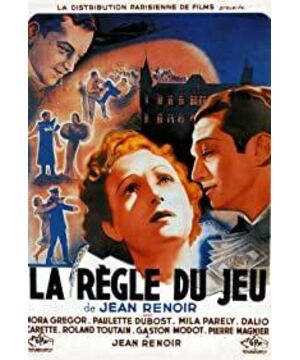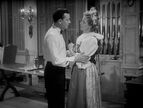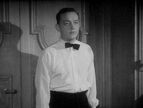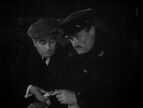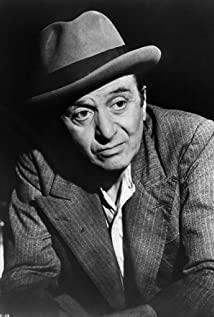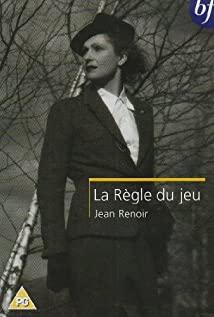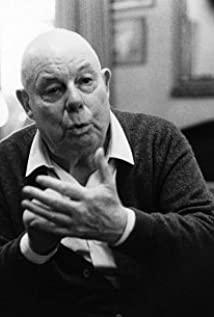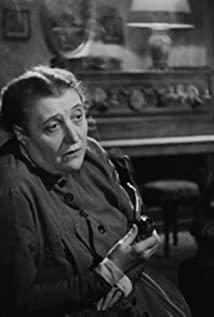Jean Renoir was the second son of the French Impressionist painter Auguste Renoir. He was fascinated by the artistic environment since he was a child. As an adult, although he studied mathematics and philosophy, and later joined the army for a long time, he was unable to stop the urge to create art. He started a film company with the property he inherited from his father. He first hired the famous actor and Napoleon's actor Albert Diotauner as the director, and filmed the film "Life Without Joy" starring his ex-wife, and he himself played a supporting role in the film as a way to study film way of making. From 1924, when he started directing his own films, by 1930, he had made 8 silent films, of which "Nana", based on the novel of the same name by the writer Zola, was the most famous. He spent millions of francs to make that film. Although the film received unanimous praise from the critics, the box office revenue was far from making up for his production expenses, causing the film company he first founded to close down. Renoir is such an artist who is willing to devote himself to art. In the 1930s, he started his own film business again, "French d'Arte d'Arte", only to be dragged down again by a high-budget film. This is known as the most perfect film in Renoir's life, "The Rules of the Game". It was ranked third among the ten "best films" since the birth of the film by the British "Picture and Sound" in 1962, the second in 1972, and the second in 1982; 1979 In 2010, it was ranked fourth among the "Top Ten Best Films" in the French 50-year sound film history by the French Academy of Cinematic Arts and Technology.
Although Renoir devoted himself to art at all costs, he was not a spiritual aristocrat in an ivory tower who made art for art's sake, and his heart was in solidarity with the people. Most of the films he made in the 1930s showed his deep sympathy for the downtrodden. Such as "The Prostitute" (also translated as "The Bitch", 1931), "Tony" (1934) and "Mr. Longie's Charge" (1935) and so on. Especially in the latter film, Renoir's progressive political leanings reached a radical level, and some people even thought it was a film "advocating a proletarian revolution". It was this political inclination that led him to actively participate in the construction of the Popular Front. But, as an artist, Renoir was not only sensitive, but also weak. On the eve of World War II, the complex class struggle in European society and the increasingly rampant reactionary forces of the monopoly bourgeoisie represented by fascism eventually turned him from pain and anger to pessimism. If it is said that his two films "Disillusionment" and "Marseillaise", which he shot in 1937, tried to reconcile the increasingly sharp contradictions at home and abroad by advocating the spirit of fraternity, which is different from his previous works, then he shot in In 1938's "Heart of a Beast with a Face and a Face", it showed obvious pessimism. The film is based on Zola's novel of the same name. The frightening indictment of class society in the original is largely downplayed, and what remains is Zola's fatalistic, hopeless sentiment about the fate of man from a genetic point of view. "Rules of the Game" is Renoir's cry of despair when his pessimism reaches its extreme.
On the surface, the film seems bland, innocuous, and ambiguous because, in Renoir's own words, he "wanted to make a comedy and tell a tragic story, and the result was a such a film with multiple meanings." Originally, he wanted to title the film "Marianne's Wayward," and apparently, in terms of plot structure, he wanted to borrow from the 19th-century romantic poet Musset's play of the same name. Later, he felt that the flamboyant style of the 18th-century comedy master Marivor, who was good at depicting customs and psychology, was an appropriate means to convey his various feelings about the European society that was on the verge of collapse at that time; ” in the play, which conceals emotions and desires, and the dialogue is gorgeous and playful. In Renoir’s view, it can be used as a weapon to counteract the evils of the times. Renoir said: "I have a deep understanding of the diseases that our generation has contracted, and I also have a clear understanding of the dangers we faced at that time, so I can find the exact situation and the appropriate way of expressing... My anxiety is like a precise compass, and I follow it every step of the way.” So the film is both carefully conceived in advance and a lot of improvisation during filming.
The basic structure of the film is parallelism and contrast. The pilot Julio and the poacher Marceau are outsiders in the alienated society of the Marquis Manor, but their emotional entanglement drives them to try to enter a society that does not belong to them, which will inevitably lead to tragic results. This "game of love and chance" has no rules at all, because in that alienated society, lies are the foundation of interpersonal relationships, and the only thing that can be counted as a rule is "saving face". The tragedy of Julio lies in his sincerity and his sobriety. He recognizes the hypocrisy of that society, but he mistakenly believes that as long as he takes his beloved out of that society and goes far away, he can find a way out. And Renoir used his fiasco to prove that the alienated society is actually the whole space for human existence, and there is no other place for people to escape. Julio's friend Octave recognized this. In effect, Renoir splits the Hamletian character in contemporary European society in two: Julio represents Hamlet's conscience, and Octave represents Hamlet's weakness. Easy-going, clumsy, and submissive, Okduff played the dumb bear at a fancy dress party, pretending to be a fool to be laughed at. But he was as awake as Julio, even more sober than Julio. In the gazebo, Christina painfully revealed to Oakduff her hatred of hypocrisy as she had a heart-to-heart with him. Okduff replied: "We live in a time when everyone is lying: advertisements in pharmaceutical factories, government announcements, radio, movies, newspapers are all lies. How can little people like us not lie along? "It can be seen that his easy-going, obedience is not because of cowardice or confusion, but just a helpless compromise. He realized that the struggle was hopeless, so he laid down his arms. He did not deceive others or betray others, he maintained his sincerity and maintained the "face" of that society - this is the so-called "rules of the game". The image of Julio and Octave is actually a split within Renoir himself. Through their different performances and different experiences at the Marquis Manor, Renoir tells us that the world is dirty, unjust, and cruel; but because the world is closed, the righteous and innocent have only two choices : Either get killed like Julio, or live like Ockduff pretending to be crazy. Renoir describes that world as a closed world that cannot be changed or improved, just like Hamlet's painful wail of "this world is a big prison". This is actually a big retrogression in his political stance, because as early as in films such as "Nana" and "Mr. Longie's Crime", he has shown that he realizes that the world, apart from the bourgeois society, There are other societies, other human groups, and they have another kind of latent vitality that can even organize and attack bourgeois society. But now, when Renoir faced the increasingly rampant dark forces, he was discouraged. He did not have the courage to create a Hamlet-like character. In his view, sincere and innocent people can only survive by seeing through the darkness of this society and feigning madness and compromising.
Artistically speaking, this is one of Renoir's most refined films. Renoir is good at shooting long takes, his extraordinary ability to organize the movement of the shot, the most praised by critics. His superb conception of the use of depth of field has become a topic of discussion among film critics after Bazin. He made the foreground and background of the same depth-of-field shot unfold in parallel, creating dramatic contrasts, thereby minimizing the need to split the same scene into several shots. For example, when Oakduff returned from the gazebo to get a coat for Christina, he met Lisette in the hall. He told Lisette that he was going to fly away with Christina. The camera pulls back with Lisette's review, and they are gradually in the background, and at this time, in the foreground we see the Marquis discussing with Julio how to arrange Cristina's future life. The Marquis said he had come to believe that there was such a thing as friendship. Two lines of action unfold in parallel in this depth-of-field shot at the same time, creating a contrasting irony that is both "objective" and succinct, and rarely used before Renoir. Here, the director is no longer a narrator, but only a revealer; he only shows the facts to the audience, and what and how much the audience sees is entirely determined by the audience's own ability. The so-called ambiguity of the film (or shot) comes from this.
Although Renoir was good at long shots, he did not underestimate the metaphors of montages and pictures. For example, the passage on the rabbit hunt is very well edited; the cruelty of the hunt foreshadows the tragedy that Jurio will suffer later. Marceau, who ran to watch Juliot when he was shot, came back and reported, "He rolled on the ground like a shot beast." We can't help but think of the shot hare's trembling limbs. scene. For another example, in the section of the masquerade, Renoir did not hesitate to paint the image of the god of death from the very beginning: three people disguised as the god of death, holding scythes, danced a gloomy "Dance of Death". The laughter of those who seek pleasure does not dilute the ominous omen caused by the image of death. Although Okduff later played the bear, bringing everyone funny, lighthearted and hilarious, the foreshadowing of the image of death finally formed an echo with the tragic ending of the film.
"Rules of the Game" is Renoir's most personal film, and it is also his last film to expose the cruel, inhuman and alienated capitalist society. Prior to this, his sympathy for the people and exposure of the rulers had relied on naturalistic or realist aesthetic concepts, but this film alone suddenly turned to a more poetic expression. He made a delicate, profound, pessimistic and humorous description of how much vitality the society's concepts of truth, love, friendship and other values still have at the critical moment when the absurdity of the "game" was revealed; With helpless laughter, he concealed and suppressed the huge resentment and despair in his heart. He expressed his feelings through the words of the people in the play: "The most chilling thing is that everyone plausibly says that they are reasonable." Renoir saw the hopeless hypocrisy of that society, but he did not see it. Where is the way out, I have no choice but to live in the image of Oakduff, a character who pretends to be crazy and sells fools, and survives while being laughed at and scolded. "Rules of the Game" is like an elegy sung by the author for the rest of his life.
Renoir went into exile in the United States in 1941, where he made films such as "My Land and My People" (1943), "The Southerner" (1945) and "The Handmaid's Diary" (1946). Although these films have certain progressive tendencies, they are no longer as sharp as Renoir did. He complied with Hollywood's "rules of the game," striving to be precise in his description of the environment, but with little to no interpretation of reality. After the 1950s, he returned to France to shoot several films, such as "The Golden Carriage" (1953), "French Cancan" (1955), "Luncheon on the Grass" (1960) and "The Hard-pressed Corporal" ( 1962), etc., there are only gorgeous coats left, and the originality of the director can no longer be found. Although he caught up with the rise of the French "New Wave" in his later years, although the directors of the "New Wave" almost held up Renoir as a banner, a "film" completely different from the "quality film" makers they attacked. author", but these accolades only mask the actual shrinking of Renoir's creativity. A vigorous Renoir actually bid farewell to the film industry as early as 1939 with his "Rules of the Game".
View more about The Rules of the Game reviews


